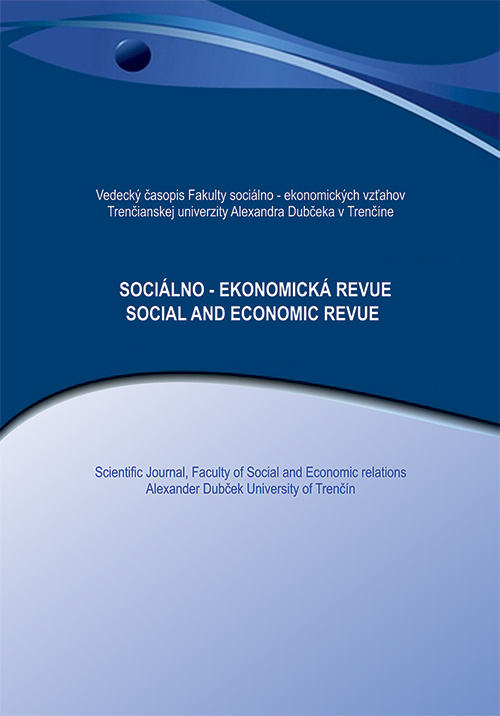GREEN HUMAN RESOURCE MANAGEMENT PRACTICES IN THE CONTEXT OF SUSTAINABLE BUSINESS DEVELOPMENT
Human resource management suggests that organizations that want to attract and in the future retain quality human resources for business with the goal of sustainable development must change the prevailing situation, especially now that human resources are consumed rather than developed. At the same time, green management of human resources was recently introduced as a response to changes at the social, economic and especially environmental level of the labor market and employment relations. Green human resources management is understood as an extension of strategic human resources management and represents a new approach to people management with a focus on long-term development, regeneration and renewal of human resources in the context of sustainable business development. However, the attributes of green HRM compared to mainstream HRM are not yet completely clear and precise. The contribution aims to fill this gap by proposing and revealing the characteristics of green human resource management and their impact and influence on business sustainability, as well as the possibilities of integrating green human resource management practices into businesses.
Vydanie: 2023/2 Strany: 47-55 Klasifikácia JEL: M12, M14, Q56
DOI: https://doi.org/10.52665/ser20230205
Kľúčové slová: green human resource management, sustainable development, business
Sekcia:
Kontakty:
Katarína Kráľová, Ing., Ph.D.
Alexander Dubček University of Trenčín
Faculty of Social and Economic Relations
Študentská 3, 911 50 Trenčín , Slovak republic
e-mail: katarina.kralova@tnuni.sk
Literatúra:
Ababneh, O. M. A. (2021). How do green HRM practices affect employees’ green behaviors? The role of employee engagement and personality attributes. Journal of Environmental Planning and Management, 64(7), 1204-1226.
Ahmad, S. (2015). Green human resource management: Policies and practices. Cogent business & management, 2(1), 1030817.
Alabdullah, T. T. Y., Ahmed, E. R., & Muneerali, M. (2019). Effect of board size and duality on corporate social responsibility: what has improved in corporate governance in Asia?. Journal of Accounting Science, 3(2), 121-135.
Andjarwati, T., Budiarti, E., Audah, A. K., Khouri, S., & Rębilas, R. (2019). The impact of green human resource management to gain enterprise sustainability. Polish journal of management studies, 20(2), 93-103.
Arulrajah, A. A., & Opatha, H. H. D. N. P. (2016). Analytical and theoretical perspectives on green human resource management: A simplified underpinning.
Backhaus, K. B., Stone, B. A., & Heiner, K. (2002). Exploringthe relationship between corporate social performance and employer attractiveness. Business & Society, 41(3), 292-318.
Bansal, P., & Roth, K. (2000). Why companies go green: A model of ecological responsiveness. Academy of management journal, 43(4), 717-736.
Behrend, T. S., Baker, B. A., & Thompson, L. F. (2009). Effects of pro-environmental recruiting messages: The role of organizational reputation. Journal of Business and Psychology, 24, 341-350.
Blok, V., Wesselink, R., Studynka, O., & Kemp, R. (2015). Encouraging sustainability in the workplace: A survey on the pro-environmental behaviour of university employees. Journal of cleaner production, 106, 55-67.
Daily, B. F., & Huang, S. C. (2001). Achieving sustainability through attention to human resource factors in environmental management. International Journal of operations & production management, 21(12), 1539-1552.
Daily, B. F., Bishop, J. W., & Steiner, R. (2007). The mediating role of EMS teamwork as it pertains to HR factors and perceived environmental performance. Journal of Applied Business Research (JABR), 23(1).
Dumont, J., Shen, J., & Deng, X. (2017). Effects of green HRM practices on employee workplace green behavior: The role of psychological green climate and employee green values. Human resource management, 56(4), 613-627.
Ehnert, I., & Ehnert, I. (2009). Sustainable human resource management. Physica‐Verlag.
Grobelna, A. (2019). Effects of individual and job characteristics on hotel contact employees’ work engagement and their performance outcomes: A case study from Poland. International journal of contemporary hospitality management, 31(1), 349-369.
Haden, S. S. P., Oyler, J. D., & Humphreys, J. H. (2009). Historical, practical, and theoretical perspectives on green management: An exploratory analysis. Management decision, 47(7), 1041-1055.
Jabbar, M. H., & Abid, M. (2014). GHRM: Motivating employees towards organizational environmental performance. MAGNT Research Report, 2(4), 267-278.
Jabbour, C. J. C., Santos, F. C. A., & Nagano, M. S. (2008). Environmental management system and human resource practices: is there a link between them in four Brazilian companies?. Journal of Cleaner Production, 16(17), 1922-1925.
Jose Chiappetta Jabbour, C. (2011). How green are HRM practices, organizational culture, learning and teamwork? A Brazilian study. Industrial and Commercial Training, 43(2), 98-105.
Jabbour, CJC (2013). Environmentálne školenie v organizáciách: Od prehľadu literatúry po rámec pre budúci výskum. Resources, Conservation and Recycling , 74 , 144-155.
Mampra, M. (2013, January). Green HRM: Does it help to build a competitive service sector? A study. In Proceedings of tenth AIMS International Conference on Management (Vol. 3, No. 8, pp. 1273-1281).
Mandip, G. (2012). Green HRM: People management commitment to environmental sustainability. Research Journal of Recent Sciences, ISSN, 2277, 2502.
Masri, H. A., & Jaaron, A. A. (2017). Assessing green human resources management practices in Palestinian manufacturing context: An empirical study. Journal of cleaner production, 143, 474-489.
Mishra, P. (2017). Green human resource management: A framework for sustainable organizational development in an emerging economy International Journal of Organizational Analysis , 25 (5), 762-788.
NASRUDDIN, E. (2015). Green Recruiting to attract and retain top talent: the significance of video interview for the manufacturing industry in Malaysia. CGHRM, 49.
Nisar, Q. A., Haider, S., Ali, F., Jamshed, S., Ryu, K., & Gill, S. S. (2021). Green human resource management practices and environmental performance in Malaysian green hotels: The role of green intellectual capital and pro-environmental behavior. Journal of Cleaner Production, 311, 127504.
Niţă, CG, & Ştefea, P. (2014). Cost control for business sustainability. Procedia-Social and Behavioral Sciences , 124 , 307-311.
Pinzone, M., Guerci, M., Lettieri, E., & Redman, T. (2016). Progressing in the change journey towards sustainability in healthcare: the role of ‘Green’HRM. Journal of Cleaner Production, 122, 201-211.
Ramus, C. A. (2001). Organizational support for employees: Encouraging creative ideas for environmental sustainability. California management review, 43(3), 85-105.
Rasool, S. F., Samma, M., Wang, M., Zhao, Y., & Zhang, Y. (2019). How human resource management practices translate into sustainable organizational performance: the mediating role of product, process and knowledge innovation. Psychology research and behavior management, 1009-1025.
Ren, S., Tang, G., & E Jackson, S. (2018). Green human resource management research in emergence: A review and future directions. Asia Pacific Journal of Management, 35, 769-803.
Renwick, DW, Redman, T., & Maguire, S. (2013). Zelené riadenie ľudských zdrojov: Program preskúmania a výskumu. International Journal of Management Reviews , 15 (1), 1-14.
Ren, S., Tang, G., & E Jackson, S. (2018). Green human resource management research in emergence: A review and future directions. Asia Pacific Journal of Management, 35, 769-803.
Roscoe, S., Subramanian, N., Jabbour, C. J., & Chong, T. (2019). Green human resource management and the enablers of green organisational culture: Enhancing a firm's environmental performance for sustainable development. Business Strategy and the Environment, 28(5), 737-749.
Roy, M. J., & Thérin, F. (2008). Knowledge acquisition and environmental commitment in SMEs. Corporate Social Responsibility and Environmental Management, 15(5), 249-259.
Tang, G., Chen, Y., Jiang, Y., Paillé, P., & Jia, J. (2018). Green human resource management practices: scale development and validity. Asia pacific journal of human resources, 56(1), 31-55.
Teixeira, A. A., Jabbour, C. J. C., de Sousa Jabbour, A. B. L., Latan, H., & De Oliveira, J. H. C. (2016). Green training and green supply chain management: evidence from Brazilian firms. Journal of cleaner production, 116, 170-176.
Victor, D. G. (2011). The collapse of the Kyoto Protocol and the struggle to slow global warming. Princeton University Press.
Y.J. Kim, W.G. Kim, H.M. Choi, K. Fetvaroon (2019) The influence of green human resource management on the ecological behavior of hotel employees and environmental behavior Int. J. Hospit. Manag., 76 (2019), s. 83 – 93


